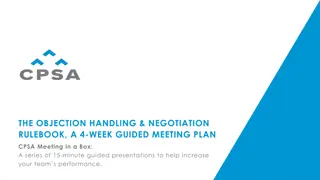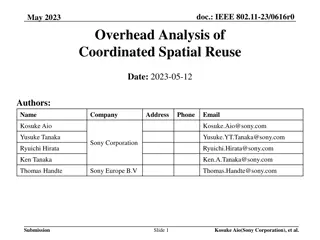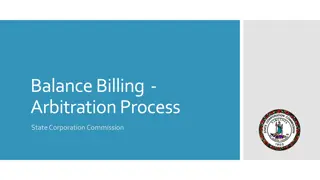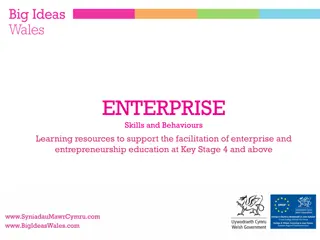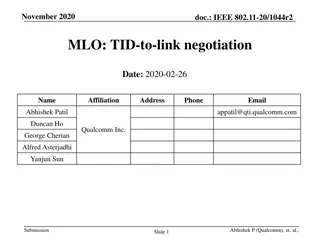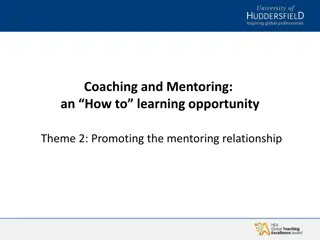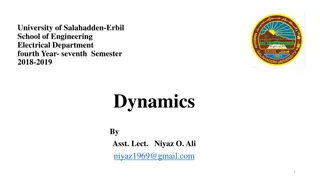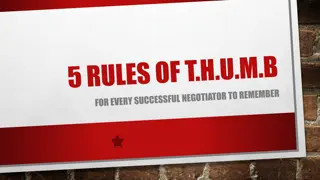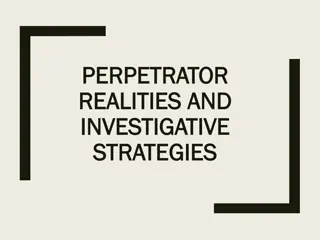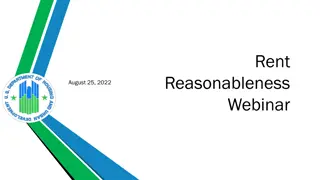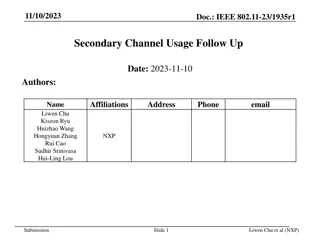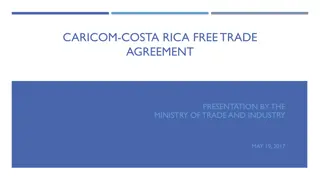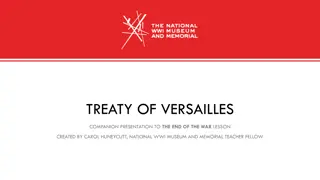Mastering Negotiation Dynamics: Key Concepts and Strategies
Explore the intricacies of negotiation dynamics, from advocacy surveys to win-win strategies, and understand essential concepts like preparation, barriers to resolution, and the bargaining zone. Uncover the 5 rules of negotiation success and learn how to prioritize negotiable items effectively for successful outcomes. Avoid common pitfalls and ensure a balanced approach to achieve mutually beneficial agreements.
Download Presentation

Please find below an Image/Link to download the presentation.
The content on the website is provided AS IS for your information and personal use only. It may not be sold, licensed, or shared on other websites without obtaining consent from the author. Download presentation by click this link. If you encounter any issues during the download, it is possible that the publisher has removed the file from their server.
E N D
Presentation Transcript
Advocacy Survey Negotiation
Negotiation Dynamics Win-Win Integrative or Cooperative Win-Lose Integrative or Cooperative/Zero-Sum or Distributive Lose-Lose Zero-Sum or Distributive
Negotiation Dynamics Shark Owl Teddy Bear Turtle Fox
Negotiation: Key Concepts Preparation, preparation, preparation What do you know? What DON T you know? Beware preparation bias
Negotiation: Key Concepts Barriers to Resolution Strategic Barriers Principal/Agent (Interests v. Incentives) Cognitive Barriers Risk aversion Loss aversion
Negotiation: Key Concepts Bargaining Zone - ZOPA Reservation Value Best Alternative to a Negotiated Agreement or BATNA Prioritized Interests Logrolling Never give anything away for free
5 Rules of T.H.U.M.B For Every Successful Negotiator To Remember T There are no give-aways in negotiation. H Help me help you. U Understand yourself. M - Make justifiable demands and concessions. B - Be curious
T There are no give-aways in negotiation As you prepare for your negotiation, you will place value on, and prioritize, your negotiable items. They will generally fall into 3 categories: Highest priority. These items have the highest value and are the most valuable to your client. Medium priority. These items are flexible , meaning you can mix-and-match them to best fit your negotiation strategy. Low priority. The items have the lowest value to your client.
T There are no give-aways in negotiation The temptation is to give away the lowest priority items and get nothing in return for them. Remember, just because an item doesn t have much value to you, doesn t mean it won t have a HIGH value to the other party.
H Help me help you In a negotiation, you have to know what the other party wants. Once you know their interests, you can use that information to create an expand the pie approach to the negotiation process.
H Help me help you How do you accomplish this? You have to sell your vision for the outcome of the negotiation. You have to actively engage with the other party. You have to learn how to ask information-gathering questions. You have to be flexible.
U Understand Yourself To be a successful negotiator, you have to know yourself. What are your negotiating strengths? What are your negotiating weaknesses? What is your tolerance for risk?
U Understand Yourself How do you learn about your negotiating self? Fill out a series of assessments. Pay attention to how you respond in everyday negotiations. Learn about different negotiating styles. The only negative attribute is one you don t know about.
M Make justifiable demands & concessions Successful negotiators have credibility. You gain credibility by being reasonable. One aspect of being reasonable is that you can justify each concession that you make.
M Make justifiable Demands & concessions What is a justifiable demand? If you are negotiating for a salary increase, you need to be able to justify the reasons you deserve it. The more objective data you have to support your request, the more likely you are to get it. What is a justifiable concession? If you make a move away from your opening offer/demand in a negotiation, you need to be able to explain the reasons you are willing/able to make that move.
B Be Curious When you prepare for a negotiation, you develop a bias (or several) that create the frame through which you approach your negotiation. If you don t stay curious, the bias will lead you to assumptions that could end up creating blind spots for you in the negotiation process.
B Be Curious How do you stay curious? Keep asking yourself what don t I know? Understand that you can only know what the other party wants by asking. Everything else is a projection of what you think they want. Ask questions that begin with I m curious




